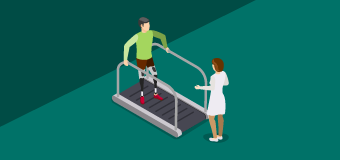6 Different Types of Counselors
If you were asked to describe different types of counselors, which positions would be on your shortlist? It’s possible you didn’t know the role extended beyond “counseling.” What services counselors perform depends solely on the context. In fields like health care and education, for example, counselors work with patients and students to help them improve their lives and achieve success.
How do different types of counselors help people with a particular problem? Take a look at six of the most common types of counselors to find out what makes each role unique.
Rehabilitation Counselor
Salary: $34,860
Career Outlook: 13% by 2026
Rehabilitation counselors help people with disabilities live independently. In this field, assistance is provided to a wide range of people, including those with physical, mental, developmental, or emotional disabilities. Those groups form approximately 12.6 percent of the American population living with a disability, according to data from the U.S. Census Bureau.
These counselors often curate treatment plans in conjunction with other health care professionals, such as doctors or physical therapists. These counselors can also work to obtain services for patients, such as job training or specialized medical care. Most rehabilitation counselors work in private practices, at community rehabilitation centers, or at senior citizen centers, though some work at hospitals and governmental health agencies.
Mental Health Counselor
Salary: $43,300
Career Outlook: 23% by 2026
Mental health counselors assess patients and develop a treatment plan, which can include individual or group sessions, and typically involves identifying negative behaviors and setting goals to overcome them.
Working as a mental health counselor involves treating individuals of any age suffering from any variety of mental illnesses, such as anxiety, depression, and bipolar disorder. These counselors can work in multiple settings, including clinics, schools, hospitals, or governmental agencies.
Substance Use Counselor
Salary: $43,300
Career Outlook: 23% by 2026
Substance use counselors, also called substance abuse or addictions counselors, work with clients individually or in groups on how best to cope with their stresses and addictions. These counselors also help clients with their careers, personal relationships, and other issues.
Substance use is a major public health issue in the United States. Nearly 20 million people ages 12 or older had a substance use disorder related to alcohol or illicit drugs in the past year, according to a report from the Substance Abuse and Mental Health Services Administration. More substance use counselors will be needed to keep up with the demand for counseling and related services. That demand is also expected to increase due to the criminal justice system’s recognition that addiction treatment can reduce recidivism. Sentences for drug offenders often requires participation in treatment and counseling programs.
Marriage and Family Counselor
Salary: $48,790
Career Outlook: 23% by 2026
Marriage and family counselors often focus on two or more clients at a time to help with changes like divorce and layoffs, as well as major life decisions like having or adopting children. The Bureau of Labor Statistics (BLS) noted that even when marriage and family counselors work with individuals, they try to keep a “family-centered” approach that results in decisions that are best for the family unit.
Marriage and family counselors can be beneficial for couples before getting married or having children. Trying to prepare for these major life events with a trained professional can lead to stronger marriages and relationships.
Career Counselor*
Salary: $55,410
Career Outlook: 13% by 2026
Career counselors evaluate clients’ interests, skills, and abilities to help them reach their professional goals. That could include planning for a bachelor’s or master’s degree or learning hard and soft skills in an internship or apprenticeship that would allow for career development. They can offer guidance on key job acquisition skills, such as interviewing, networking, and writing an engaging cover letter.
Counselors could also work with people who are already in the workforce, helping resolve work-place conflicts or creating a plan for mid-career advancement. Most career counselors work at high schools or in university settings, though others work in private practice.
School Counselor*
Salary: $55,410
Career Outlook: 13% by 2026
School counselors prepare students for success in school and beyond by providing comprehensive support. That includes direct student services like instruction, student planning, and crisis response, as well as indirect student services like consultation, collaboration with professionals and family members, and referrals to school and community resources, according to the American School Counselor Association. These counselors work with students of all ages, from elementary school through the end of high school.


